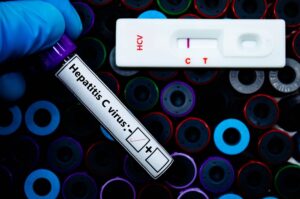
Signs of Stomach Ulcers
Stomach ulcers are open sores that develop on the lining of the stomach or small intestine, but heartburn is caused when stomach acid flows back into the esophagus.

Celiac disease is an autoimmune disorder caused by a reaction to gluten, a protein found in wheat, barley, and rye. This reaction causes damage to the small intestine, leading to malabsorption of nutrients and other complications. One of these complications is iron deficiency anemia (IDA).
Iron deficiency anemia occurs when there is a lack of iron in the body, which can decrease the production of red blood cells. This can lead to fatigue, weakness, shortness of breath, and pale skin. Celiac disease is one of the leading causes of IDA.
Anemia, specifically iron deficiency anemia, arises when the body lacks enough iron to produce adequate red blood cells necessary for carrying oxygen throughout the body. People with anemia may experience various symptoms due to insufficient oxygen supply to the body’s tissues. These can include:
The underlying cause of anemia in celiac patients is usually malabsorption. In celiac disease, the immune reaction to gluten damages the small intestinal lining, impairing iron absorption and other essential nutrients.
While celiac disease can indeed lead to anemia, it’s important to note that there are various other potential causes of this condition.
Celiac disease not only triggers an immune response damaging the small intestine, but it also leads to iron-deficiency anemia due to inadequate absorption of iron. Iron is vital for producing hemoglobin, the protein in red blood cells responsible for carrying oxygen to tissues and organs. When individuals with celiac disease consume gluten, the resulting intestinal damage prevents the adequate absorption of iron, leading to a deficit.
Consequently, the body cannot produce enough functional red blood cells, leading to anemia. Symptoms of iron-deficiency anemia in the context of celiac disease, such as fatigue, weakness, and dizziness, might be some of the first noticeable signs of this underlying autoimmune condition.
A direct relationship exists between malnutrition and the development of iron deficiency anemia in patients with celiac disease. Malnutrition, in this context, refers not to a lack of food but rather to an inadequate absorption of nutrients due to damage to the small intestine. Despite having an iron-rich diet, individuals with celiac disease often struggle with iron deficiency.
The reasons are twofold: not only does the immune reaction to gluten cause malabsorption, but inflammation in the gut also inhibits the body’s ability to utilize iron efficiently. This malabsorption and subsequent malnutrition contribute significantly to the development of iron-deficiency anemia seen in many patients with celiac disease. Consequently, it is important to recognize and address both the gluten-triggered autoimmunity and the resultant malnutrition to effectively manage and treat iron-deficiency anemia in individuals with celiac disease.
A gluten-free diet is a diet that excludes the protein gluten. Gluten is found in grains such as wheat, barley, rye, and a cross between wheat and rye called triticale. A gluten-free diet is essential for managing symptoms and complications associated with certain medical conditions such as celiac disease.
In a gluten-free diet, one must avoid all foods containing gluten. This includes many food items such as bread, pasta, cereal, and baked goods, commonly containing gluten. Some processed foods, sauces, and beverages may also include gluten, often as a flavor enhancer or thickening agent.
However, a gluten-free diet doesn’t have to be restrictive. Many healthy and delicious foods are naturally gluten-free. These include fruits, vegetables, meats, seafood, dairy, beans, legumes, and a variety of whole grains like quinoa, rice, and millet.
Moreover, with the increased awareness and diagnosis of celiac disease, there has been a surge in the availability of gluten-free versions of popular foods. These include bread, pasta, and cereals, now readily available in most supermarkets.
It’s imperative, however, to carefully read the labels when shopping for gluten-free products, as some products might be labeled “wheat-free” but could still contain other forms of gluten. Living with a gluten-free diet requires careful reading of food labels unless the food is fresh and naturally gluten-free. Consulting with a nutritionist or dietitian can also be beneficial in managing and maintaining a balanced, nutrient-rich, gluten-free diet.
If you are experiencing persistent symptoms of iron-deficiency anemia, such as chronic fatigue, weakness, dizziness, or shortness of breath, it’s crucial to consult your healthcare provider. These symptoms could indicate an underlying condition, such as celiac disease, that requires medical attention. Additionally, suppose you’ve been diagnosed with celiac disease and are following a gluten-free diet but still experiencing symptoms of anemia. In that case, this is also an excellent reason to seek medical advice.
Sometimes, despite adhering to a strict gluten-free regimen, the damage to the small intestine might take time to heal, and additional treatment might be necessary to support iron absorption and address iron-deficiency anemia. Always remember that early detection and management of any health issue not only leads to more effective treatment but also prevents potential complications down the line.

Stomach ulcers are open sores that develop on the lining of the stomach or small intestine, but heartburn is caused when stomach acid flows back into the esophagus.

Poorly absorbed carbs may ferment in the gut, leading to symptoms such as bloating, gas, diarrhea, or constipation.

If left untreated, GERD can lead to complications including esophagitis (inflammation of the esophagus), strictures (narrowing of the esophagus), or even Barrett’s esophagus, a condition that increases the risk of esophageal cancer.

IBS-C often requires a tailored approach that incorporates dietary changes, stress management, and sometimes prescribed medications to regulate bowel movements and reduce discomfort.

Hepatitis C can affect women differently due to hormonal variations, immune system responses, and unique physiological factors

This connection means that stress, anxiety, and other psychological factors can directly impact gut function, leading to symptoms like abdominal pain, bloating, and irregular bowel movements.

Chronic inflammation associated with IBD can lead to complications such as joint pain, skin conditions, eye issues, and more.

How different types of fiber affect IBS is crucial to creating a diet that supports digestive health without triggering flare-ups.

Lactose Intolerance occurs due to a deficiency of lactase, the enzyme responsible for digesting lactose in the small intestine.

This condition can result from various factors, including poor diet, stress, infections, or underlying health conditions like IBD.

One of the most essential steps in managing IBS is identifying specific triggers and paying attention to your body’s unique responses.

Although the symptoms of IBS can vary widely from person to person, several common signs are associated with the condition.
For Your Visit
Brick Office
P: 732-458-8300
Brick Medical Arts Building
1640 Route 88, Suite 202
Brick, New Jersey 08724
Mon – Fri: 8:30AM – 5:00PM
Sat & Sun: Closed
Neptune Office
P: 732-776-9300
Jersey Shore Medical Arts Building
1944 Corlies Ave. Suite 205
Neptune, New Jersey 07753
Mon – Fri: 8:30AM – 5:00PM
Sat & Sun: Closed
Jackson Office
P: 732-928-2300
706 Bennetts Mills Road
Jackson, New Jersey 08527
Mon – Fri: 8:30AM – 5:00PM
Sat & Sun: Closed
© All Rights Reserved